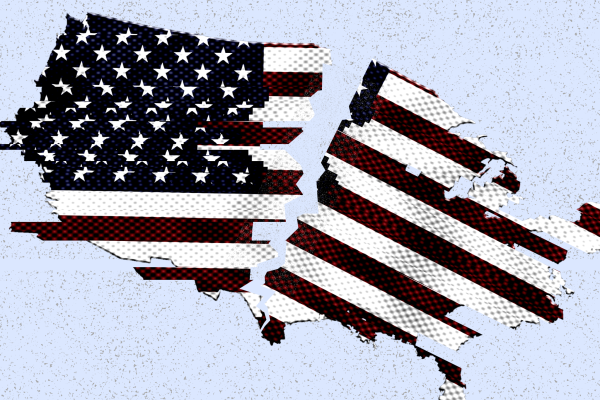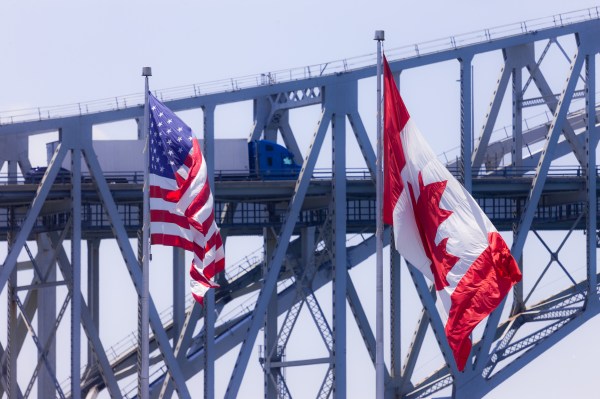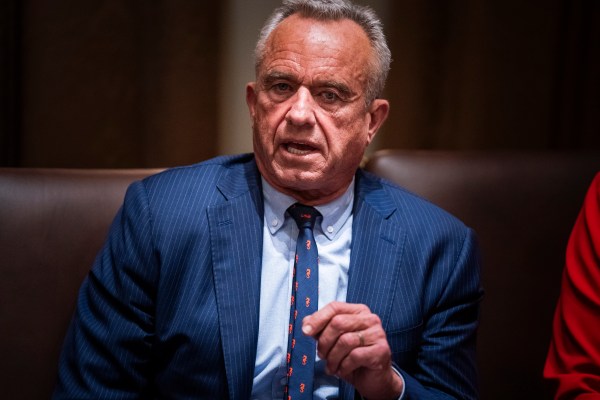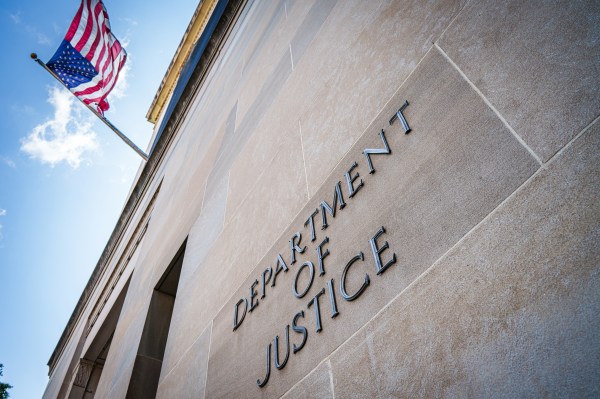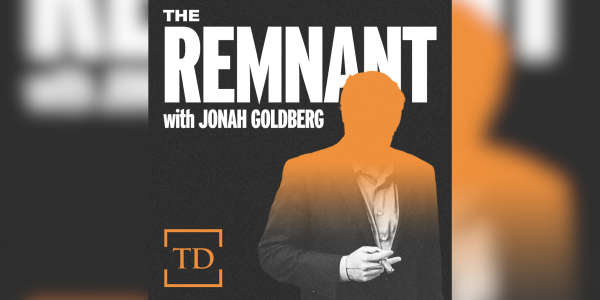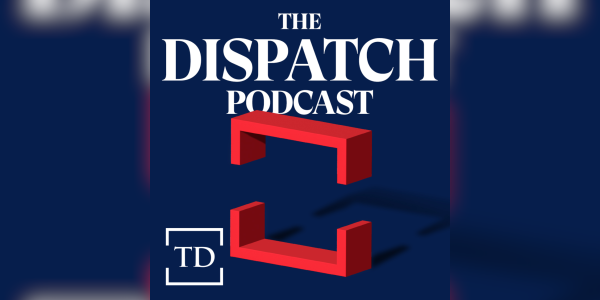Happy Monday! Some scientists have claimed that those “dire wolves” were actually not a resuscitation of an extinct species. Jurassic Park averted?
Quick Hits: Today’s Top Stories
- Pennsylvania Gov. Josh Shapiro and his family were evacuated from their home early Sunday morning following a suspected arson attack. A 38-year-old man, Cody Balmer, has been arrested in connection with the incident at the governor’s mansion in Harrisburg and will be charged with attempted murder, terrorism, aggravated arson, and aggravated assault. The suspect allegedly scaled a 7-foot-high security fence, evaded police officers, and forcibly entered the mansion where Shapiro, his family, and friends were staying during Passover, using a homemade incendiary device to start the fire. No one was injured in the fire, which resulted in significant damage to parts of the home. “This type of violence is not OK,” Shapiro said in brief remarks. “I don’t give a damn if it’s from one particular side or another. It’s not OK.”
- Russia launched a missile attack on the northern Ukrainian city of Sumy on Sunday, killing 34 people and injuring more than 100 others. The strikes—which Ukrainian President Volodymyr Zelensky said deliberately targeted a civilian area—came two days after a meeting between U.S. envoy Steve Witkoff and Russian President Vladimir Putin in St. Petersburg to continue the Trump administration’s push for a ceasefire. Kremlin spokesman Dmitry Peskov said Saturday that talks between the U.S. and Russia were proceeding well, but “instant results” were not possible.
- Representatives from the U.S. and Iran held their first round of talks in Oman on Saturday, part of the Trump administration’s efforts to reach a deal that curbs Iran’s nuclear program. The negotiations were mostly conducted through intermediaries, but reportedly involved direct contact between U.S. and Iranian officials. The White House described the talks, which included Witkoff and Iranian Foreign Minister Abbas Araghchi, as “very positive and constructive.” The next round of negotiations is scheduled for April 19.
- Tariff exemptions on consumer electronics like smartphones and laptops are temporary, Commerce Secretary Howard Lutnick told ABC News on Sunday, signaling that additional duties are still to come. The statement marked an apparent reversal from the Trump administration’s Friday move to exclude the products from blanket levies on imported Chinese goods. President Donald Trump further muddied the waters later on Sunday, writing on Truth Social that the imports are still subject to 20 percent tariffs he unveiled before his ramped-up “reciprocal” tariffs on April 2. “There was no Tariff ‘exception’ announced on Friday,” he said. “These products are subject to the existing 20% Fentanyl Tariffs, and they are just moving to a different Tariff ‘bucket.’” Amid the escalating trade war, China has announced plans to respond with additional tariffs on U.S. goods, export restrictions on critical minerals, and a range of other actions against U.S. companies.
- Justice Department attorneys told U.S. District Judge Paula Xinis on Sunday that the Trump administration had no legal obligation to assist in the return of Kilmar Abrego Garcia, a Salvadoran national and Maryland resident who was deported to a high-security prison in El Salvador due to an “administrative error.” The lawyers wrote that the Justice Department understood the Supreme Court’s Thursday ruling ordering the White House to “facilitate” Garcia’s return to mean only that immigration officials would be required to admit Garcia if he attempted to re-enter the United States. The Justice Department also claimed that any attempt by Xinis to force the U.S. to engage with El Salvador on returning deportees would constitute a violation of the separation of powers. Nayib Bukele, the president of El Salvador, is set to visit the White House later today.
- An immigration judge in Louisiana ruled Friday that Mahmoud Khalil, a Columbia University graduate student and U.S. green-card holder, can be legally deported in connection with his prominent role in leading anti-Israel protests on Columbia’s campus last year. Judge Jamee Comans said that the government was entitled under the Immigration and Nationality Act to deport Khalil, a legal permanent resident, for opposing the United States’ foreign policy interests. Secretary of State Marco Rubio had released a memo last week that did not allege Khalil had engaged in any criminal activity, but argued his participation in “antisemitic protests and disruptive activities” had fostered “a hostile environment for Jewish students in the United States.” Khalil’s attorneys have until April 23 to request relief from deportation.
‘Actual Trade Predators’
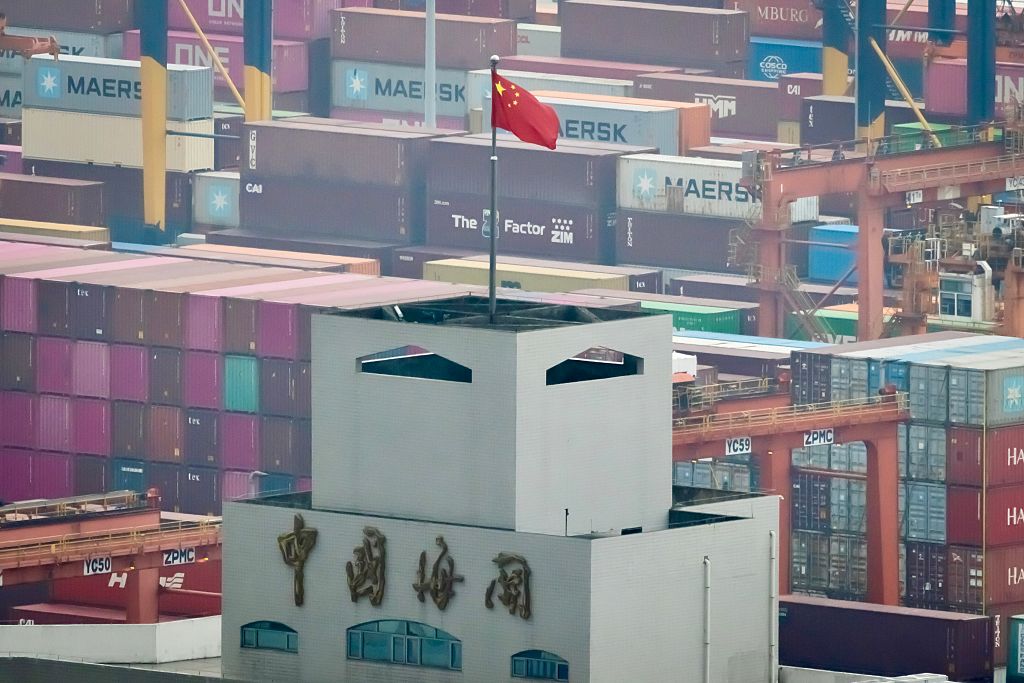
After years in a toxic relationship, the U.S. and China may finally be on the verge of a messy (economic) breakup.
Last week, President Donald Trump announced plans to walk back nearly all of his tailored, or “reciprocal” levies, with one major exception: China. As Washington and Beijing unleash a volley of tariffs and counter-tariffs, the tit-for-tat could soon escalate into a bona fide trade war.
But trade tensions between the two countries had been escalating well before Trump’s sweeping tariffs rollout this month. The Biden administration had levied tariffs against certain Chinese goods, and those tariffs were themselves an extension of duties Trump had put into effect during his first term. In early February, however, the second Trump administration—citing the inflow of fentanyl into the United States—had established 10 percent tariffs on Chinese imports, with Beijing vowing “countermeasures” that included levies on U.S. energy. One month later, the Trump administration increased the tariffs by another 10 percent, sparking additional industry-specific tariffs from China. And on April 2, the Trump administration imposed its “reciprocal tariffs,” bringing China’s total tariff rate to 54 percent. After multiple ensuing exchanges, the combined U.S. tariff rate on Chinese goods now stands at a whopping 145 percent, and China’s tax on U.S. imports has reached 125 percent.
Trump may play fast and loose with accusations of unfair trade practices, but when it comes to China specifically, his concerns are well-founded. America’s third-largest trading partner is known for engaging in intellectual property theft, forced technology transfers, and other trade dealings that disadvantage the United States. But entering a rapidly escalating tariff war with China—after spurning a number of would-be allies in such a conflict—may not fix the deep-seated problems with Chinese trade practices.
Trump’s current slate of tariffs seems fixated on reducing bilateral trade deficits across the globe, and, according to Derek Scissors, senior fellow at the American Enterprise Institute focused on the Chinese economy, “China is the biggest source of the U.S. trade deficit.” But even setting that aside, Beijing’s trade practices themselves disadvantage U.S. interests. “They’re actual trade predators,” Scissors told TMD. “First, they protect their markets for the sake of state-owned enterprises, then they outward predate by targeting tech leaders in other countries for both theft and to be subsidized out of business.”
One of the major concerns about China’s economy is how closed off it is from outside competition. “When China says free trade, they mean free trade except for their state sector,” Scissors said. “You can’t have a free trade agreement with China, and you can’t have free trade with China.” Beijing suppresses competition against its state-owned enterprises, blocking large swaths of its economy from any kind of open market and making it impossible for U.S. companies to compete in certain industries. It also restricts certain American companies from operating in the country at all, including tech companies like Facebook and Google, which are banned under the Chinese government’s “Great Firewall.”
China also has a long history of stealing intellectual property (IP) from American owners, subverting U.S. businesses’ competitive edge in the market. Beijing often requires foreign companies to set up joint ventures with local partners, allowing those local partners to essentially copy the American products themselves. In other instances, China acquires information through hacking and espionage. And because of state subsidies, Chinese companies can then use the stolen IP to compete in the global market with an advantage over non-Chinese businesses. The practice has cost American companies billions of dollars.
At the same time, China floods international markets with its own products at discounted rates—a practice known as “dumping”—in an effort to undercut competition abroad. “China has doubled down on export-led growth, and it is pushing out products at a rate that the global economy cannot absorb,” David Sacks, a fellow for Asia studies at the Council on Foreign Relations, told TMD. “People have been calling for tariffs like this on China for a number of years.”
The levies are likely to have a dramatic effect. “Trade is going to go down quite dramatically,” Sacks added. “And decoupling becomes a real possibility here, where most people believed that that was pretty infeasible just a few months ago.” Indeed, few analysts expected tariffs on Chinese goods as high as 145 percent—particularly accompanied by measures targeting America’s closest allies, whose support the U.S. would need to enlist as it sought to break its trade ties to Beijing.
Nor is it clear that Trump has a strategy for economic separation. Instead, he seems intent on reaching an agreement that evens out the trade balance between the two countries. “I think that Trump is still looking for a deal, and he believes that adding tariffs on top of tariffs gives him more leverage and will bring China to the negotiating table,” Sacks said. “[But] China is not going to come to the negotiating table like that. I think they’ve been pretty clear publicly that they are prepared to accept a lot of pain. I actually think that they are. I don’t think it’s all bluster.”
Last week, Trump said that he was waiting for a call from Chinese leader Xi Jinping so the two could work out a deal. But U.S. Trade Representative Jamieson Greer told CBS News on Sunday that there are no plans for the leaders to talk, and, according to Reuters, China is encouraging other countries to stand against U.S. tariffs. Chinese officials recently began sharing clips featuring the late Mao Zedong saying, “We will never yield.”
This likely isn’t the response Trump was hoping for. But Scissors argued that China’s refusal to negotiate with the United States could ultimately be in America’s interest. “The best-case scenario is that the Chinese won’t talk to [Trump],” Scissors said, adding that a lack of contact could result in an economic decoupling with China that would be nearly inevitable if neither country backs down from its tariffs. In that scenario, the U.S. could theoretically work together with allies to address China’s predatory trade practices. “I think it’s less about, ‘Do you reach a deal with China?’ And I think it’s more about what you do with the rest of the world to reorder or rebalance global trade,” Sacks said. “Yes, China is our third-largest trading partner, but if we’re able to offset a lot of it by renegotiating trade agreements with our friends and allies, then I think that would be a good outcome.”
At the same time, the U.S. is already exposed to loopholes that China can exploit. “All we’re going to do right now is have the Chinese ship goods through other countries because we’re not prepared to deal with them circumventing our tariffs,” Scissors said. Chinese companies can simply reroute their goods through countries with lower tariffs, paying another country’s tariff rate instead of their own. This also happened in the first Trump administration—billions in Chinese goods were funneled through Vietnam to avoid tariffs. If the Trump administration was serious about enforcing its 145 percent tariffs, Scissors argued, it would have announced additional funding for enforcement resources. As of now, the Trump administration has not stated a comprehensive plan to enforce its current levies.
And if Trump’s “reciprocal” tariffs on the rest of the world are reinstated at the end of the 90-day reprieve he announced last week, inflation, unemployment, and scarcity of goods could wreak havoc on the global economy. But either way, the U.S. is likely to face intensifying economic strain. China is already planning to put pressure on American companies, including insisting that they give up their intellectual property or lose access to the Chinese market. Beijing has already moved to blacklist more American businesses.
Many U.S. companies began moving their supply chains out of China in recent years—Apple, for example, has relocated much of its manufacturing to India—but even businesses taking proactive steps have not completely eliminated Chinese involvement in production. The Trump administration seemed to acknowledge this on Friday, giving technology companies a break from the tariffs by moving to exempt smartphones and other technological devices. Only two days later, though, Trump said on Truth Social that the administration would be looking at the “WHOLE ELECTRONICS SUPPLY CHAIN” for another round of tariffs.
If Trump and Xi eventually meet at the negotiating table, the terms of any kind of deal could have a significant impact on U.S. alliances—with devastating long-term effects if Trump’s affinity for deal-making takes priority over relationships with allies. “The worst-case scenario is that we treat our friends worse than the Chinese, that we make a deal with China because Xi Jinping is a dictator and can promise things that democratic leaders can’t,” Scissors said. “Trump leaves [office], and they start squeezing us because we got into a closer economic relationship with a cult-of-personality dictatorship, and we’ve alienated our friends who might help us in this confrontation.”
Treasury Secretary Scott Bessent has insisted that isolating China has been Trump’s plan all along, while White House press secretary Karoline Leavitt said allies have moved closer to the U.S. But time will tell whether that will remain the strategy for further rounds of tariffs—or if it ever was the strategy at all.
“If you had a strategy to focus on China,” Scissors said, “you would not have started with attacking the Canadians.”
Today’s Must-Read

The Tech Right Has a Flag. They Just Need to Plant It.
Not since the Apollo program has America been so enthralled by the promise of technology. Elon Musk, President Donald Trump’s closest adviser, founded and runs a company most famous for commercial spaceflight and its mission to establish a colony on Mars. NASA intends to put American boots back on the moon for the first time since 1972. Recent developments in artificial intelligence promise to transform how we work and live. A new generation of innovators—the “tech right”—champion such developments, sketching an almost utopian vision of humanity’s future. For all their rough edges, the rise of Musk, Marc Andreessen, Jeff Bezos, and the like represents something profoundly promising: long-dormant hope bubbling beneath the surface of our postmodern pessimism.
Toeing the Company Line
Worth Your Time
- When Israelis gathered for the Passover Seder on Saturday, many left an empty chair for the hostages still in Gaza. For the Times of Israel, Melanie Lidman spoke to the family members spending another holiday without their loved ones. “Relatives of hostages held by terrorists in Gaza say they feel the absence of their loved ones acutely during Passover, which commemorates the Exodus of the ancient Israelites from Egypt and their liberation from slavery,” she wrote. “April brings a host of difficult days for the Miran family: Alma’s second birthday, Omri’s birthday, and the Passover holiday. They mark all the milestones because Miran Lavi wants her daughters to experience some joy. But each time the family gathers to blow out the candles on a birthday cake or sing songs during their Passover meal, it only sharpens Omri’s absence. … Viki Cohen says her family has not marked any Jewish holidays since her 20-year-old son, Nimrod, a soldier, was taken by terrorists from his tank in southern Israel. ‘We don’t gather as a family, because it reminds us how much he is missing, and that he’s not with us, and it’s very hard for us,’ she said. The only time the extended family gathers is at protests.’”
- Writing for The Atlantic, Harvard University professor Danielle Allen set out a playbook for elite universities to rebuild trust with the American public. It’s full of engaging proposals, like this one: “Civic strength resides fundamentally in relationships, and we need to do a better job of developing relationships across our many lines of division. In part by self-selection, many conservative academics choose career paths in right-leaning think tanks instead of teaching in top universities. To some extent, they are also excluded from those universities. Both dynamics—self-segregation and exclusion—are at work. We need to change that. A good way to start would be to establish two-year visiting professorships on elite campuses for academics in right-leaning think tanks. Doing so would help revitalize the debate culture of our campuses and reanimate the fundamental ideal of academic freedom on which we all depend for the pursuit of truth.”
Business Insider: The White House Says Trump’s Weight and ‘Frequent Victories’ at Golf Games Are Evidence of Good Health
The Telegraph: Bernie Sanders Urges Coachella Crowd To Stand Up Against ‘U.S. Oligarchy’
In the Zeitgeist
In an absolutely thrilling finish to the 89th Masters Tournament on Sunday, Rory McIlroy defeated Justin Rose in a sudden-death playoff to complete a career Grand Slam. Here’s a look at his emotional finish:
Let Us Know
Do you think an economic decoupling with China is the right move?


